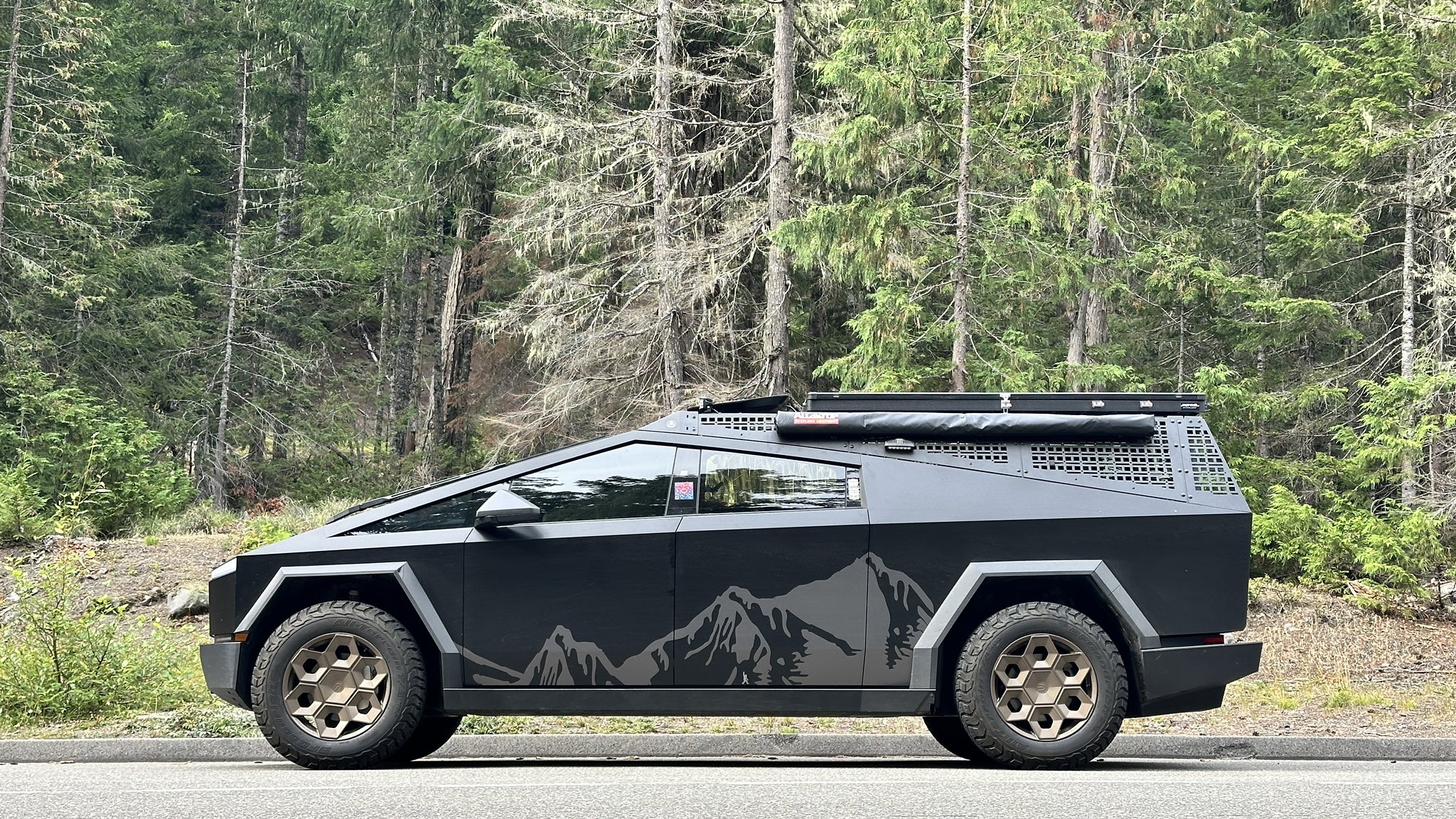
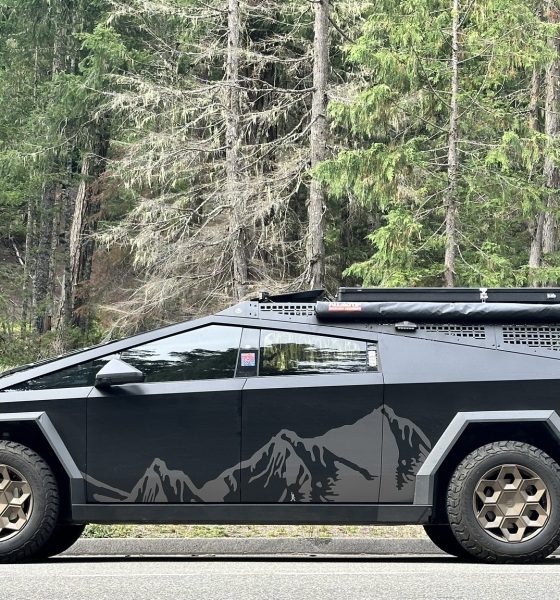
Lifestyle
Tesla Arctic Cybertrek expedition aims to go farther than any Cybertruck has ever gone before
An ongoing Tesla Cybertruck expedition to the Arctic Ocean has been quietly catching the attention of the electric vehicle community. If successful, the participants of the expedition would be able to bring their Cybertrucks farther than anyone before.
The participants of the Cybertruck Arctic expedition, dubbed the Arctic Cybertrek, are veteran Tesla owners operating two modified Cybertrucks. The project’s official website describes the route that the twin Cybertrucks of the expedition would take to reach the edge of the Arctic Ocean.
Crazy when you see the route!
https://t.co/Z00OORgNDV— Wes (@wmorrill3) August 27, 2024
“The ultimate Arctic adventure begins on the fabled Dempster Highway. Long ribbons of road stretch 460 miles from Dawson City in Yukon to Inuvik in the Northwest Territories. Traversing stunning landscapes through the boreal forest, crossing Canada’s largest river – the mighty Mackenzie – out onto the Tundra, and onto the Inuvik- Tuktoyaktuk Highway, ending right at the edge of the Arctic Ocean,” the expedition’s official page read.
What an absolutely breathtaking place pic.twitter.com/oQXakjwFPH— Bearded Tesla (@BeardedTesla) August 28, 2024
Participants of the Arctic Cybertrek, such as @teslatino, @beardedtesla, and @blueskykites, have been posting updates of their journey on social media, and so far, it appears that the expedition is going well. Of course, there are challenges along the way, such as the absence of electric vehicle charging infrastructure, as well as dangerous roads. But that, ultimately, is part of the journey’s charm.
So this happened ?♂️ pic.twitter.com/lOTtaSNQeX— Bearded Tesla (@BeardedTesla) August 29, 2024
For now, one could only hope that twin Cybertrucks of the Arctic Cybertrek expedition do reach their destination without any issues. If successful, the Tesla owners would be able to prove that the Cybertruck is an all-electric vehicle that could reach some of the most stunning and remote parts of the world, even without features like Full Self-Driving (FSD).
Sometimes it’s hard to understand the Yukon landscape. pic.twitter.com/i99iiAN9bN— TesLatino (@TesLatino) August 28, 2024
The Tesla Cybertruck’s toughness has been such a huge part of the vehicle’s marketing that it has spawned video after video of influencers just beating on the all-electric pickup truck until something breaks. While Cybertruck durability tests are mostly low-brow fun, they have gotten quite old as of late. It is then quite refreshing to see an honest-to-goodness long-distance test of the Cybertruck being done by Tesla owners not for clout but for the sustainability movement and the EV community as a whole.
We’re finally at the pre-stage area. Whitehorse, Yukon pic.twitter.com/dS7Neu0fPO— TesLatino (@TesLatino) August 28, 2024
Don’t hesitate to contact us with news tips. Just send a message to simon@teslarati.com to give us a heads up.

Lifestyle
Tesla Model S Plaid battles China’s 1500 hp monster Nurburgring monster, with surprising results
There is just something about Tesla’s tuning and refinement that makes raw specs seem not as game-changing.
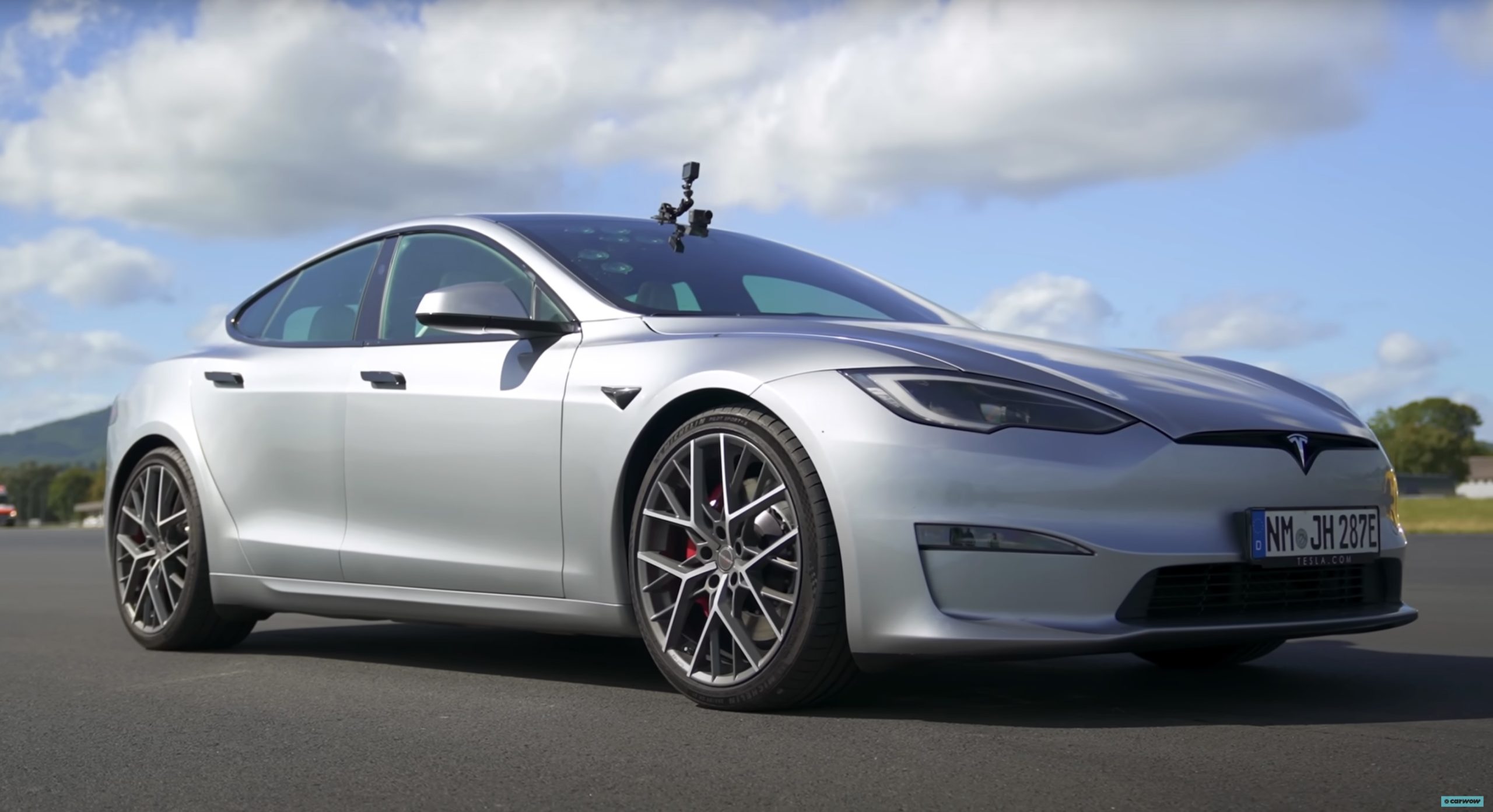
The Tesla Model S Plaid has been around for some time. Today, it is no longer the world’s quickest four-door electric sedan, nor is it the most powerful. As per a recent video from motoring YouTube channel Carwow, however, it seems like the Model S Plaid is still more than a match for some of its newer and more powerful rivals.
The monster from China
The Xiaomi SU7 Ultra is nothing short of a monster. Just like the Model S Plaid, it features three motors. It also has 1,548 hp and 1,770 Nm of torque. It’s All Wheel Drive and weighs a hefty 2,360 kg. The vehicle, which costs just about the equivalent of £55,000, has been recorded setting an insane 7:04.957 at the Nurburgring, surpassing the previous record held by the Porsche Taycan Turbo GT.
For all intents and purposes, the Model S Plaid looked outgunned in Carwow’s test. The Model S Plaid is no slouch with its three motors that produce 1,020 hp and 1,420 Nm of torque. It’s also a bit lighter at 2,190 kg despite its larger size. However, as the Carwow host pointed out, the Model S Plaid holds a 7:25.231 record in the Nurburgring. Compared to the Xiaomi SU7 Ultra’s record, the Model S Plaid’s lap time is notably slower.
Real-world tests
As could be seen in Carwow’s drag races, however, Tesla’s tech wizardry with the Model S Plaid is still hard to beat. The two vehicles competed in nine races, and the older Model S Plaid actually beat its newer, more powerful counterpart from China several times. At one point in the race, the Xiaomi SU7 Ultra hit its power limit due to its battery’s temperature, but the Model S Plaid was still going strong.
The Model S Plaid was first teased five years ago, in September 2020 during Tesla’s Battery Day. Since then, cars like the Lucid Air Sapphire and the Xiaomi SU7 Ultra have been released, surpassing its specs. But just like the Model Y ended up being the better all-rounder compared to the BYD Sealion 7 and the MG IM6, there is just something about Tesla’s tuning and refinement that makes raw specs seem not as game-changing.
Check out Carwow’s Model S Plaid vs Xiaomi SU7 drag race video below.
Lifestyle
500-mile test proves why Tesla Model Y still humiliates rivals in Europe
On paper, the BYD Sealion 7 and MG IM6 promised standout capabilities against the Model Y.
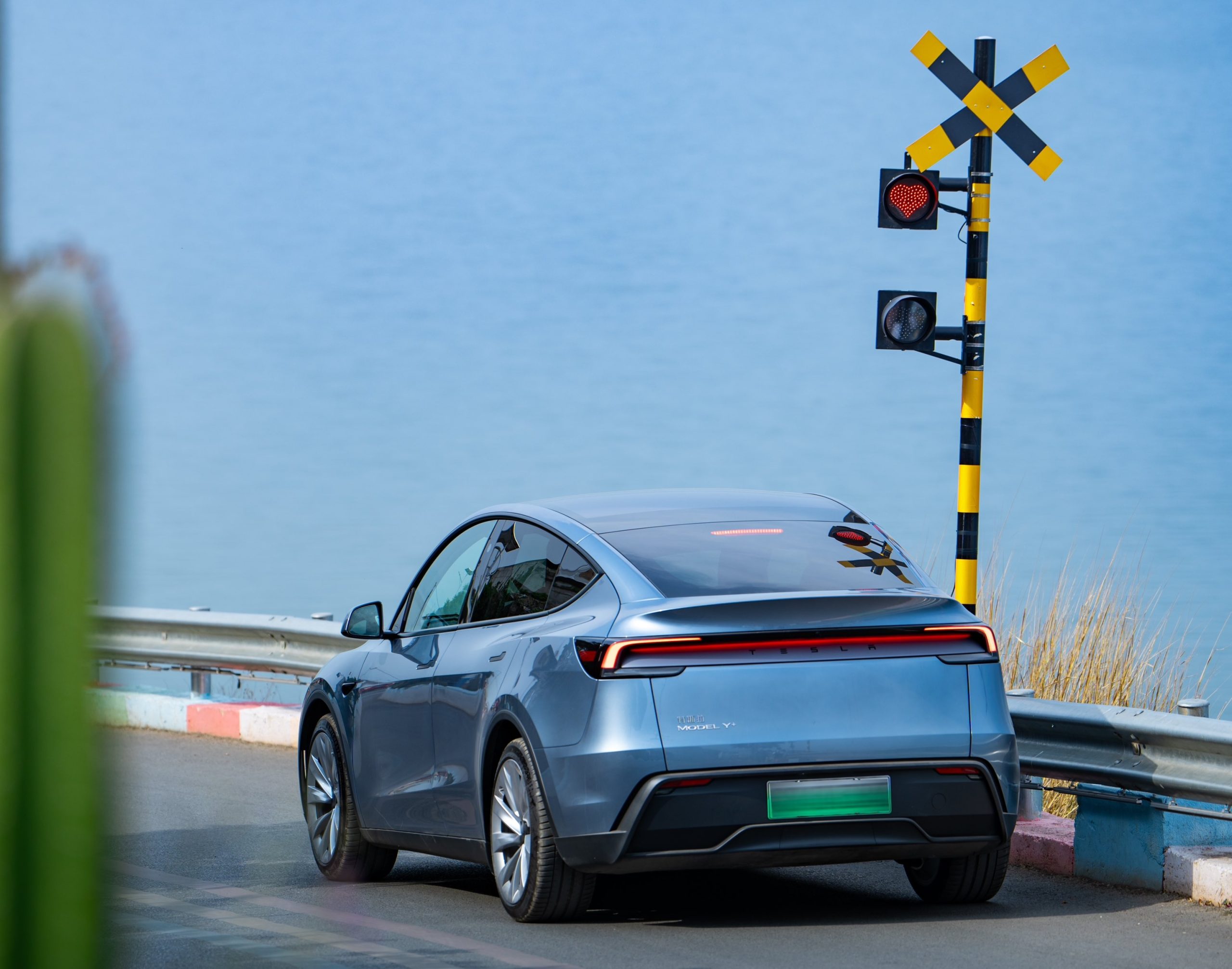
BYD is seeing a lot of momentum in Europe, so much so that mainstream media has taken every opportunity to argue that the Chinese automaker has beaten Tesla in the region. But while BYD sales this year in Europe are rising and Tesla’s registrations remain challenged, the raw capabilities of vehicles like the Model Y are difficult to deny.
This was highlighted in a 500-mile challenge by What Car? magazine, which showed that the new Tesla Model Y is more efficient, cheaper to run, and more reliable than rivals like the BYD Sealion 7, and even the nearly 400 KW-charging MG IM6.
Range and charging promises
On paper, the BYD Sealion 7 and MG IM6 promised standout capabilities against the Model Y. The Sealion 7 had more estimated range and the IM6 promised significantly faster charging. When faced with real-world conditions, however, it was still the Model Y that proved superior.
During the 500-mile test, the BYD nearly failed to reach a charging stop, arriving with less range than its display projected, as noted in a CarUp report. MG fared better, but its charging speeds never reached its promised nearly-400 kW charging speed. Tesla’s Model Y, by comparison, managed energy calculations precisely and arrived at each stop without issue.
Tesla leads in areas that matter
Charging times from 25% to 80% showed that the MG was the fastest at 17 minutes, while Tesla and BYD were close at 28 and 29 minutes, respectively. Overall efficiency and cost told a different story, however. The Model Y consumed 19.4 kWh per 100 km, compared to 22.2 for MG and 23.9 for BYD. Over the full trip, Tesla’s charging costs totaled just £82 thanks to its supercharger network, far below BYD’s £130 and MG’s £119.
What Car? Magazine’s testers concluded that despite BYD’s rapid sales growth and the MG IM6’s seriously impressive charging speeds, Tesla remains the more compelling real-world choice. The Model Y just offers stability, efficiency, and a proven charging infrastructure through its Supercharging network. And as per the magazine’s hosts, the Model Y is even the cheapest car to own among the three that were tested.
Watch What Car? Magazine’s 500-mile test in the video below.
Lifestyle
Tesla Cybertruck slapped with world’s least intimidating ticket, and it’s pure cringe
One cannot help but cringe and feel second-hand embarrassment at the idea of a person just driving around with a stack of these babies.
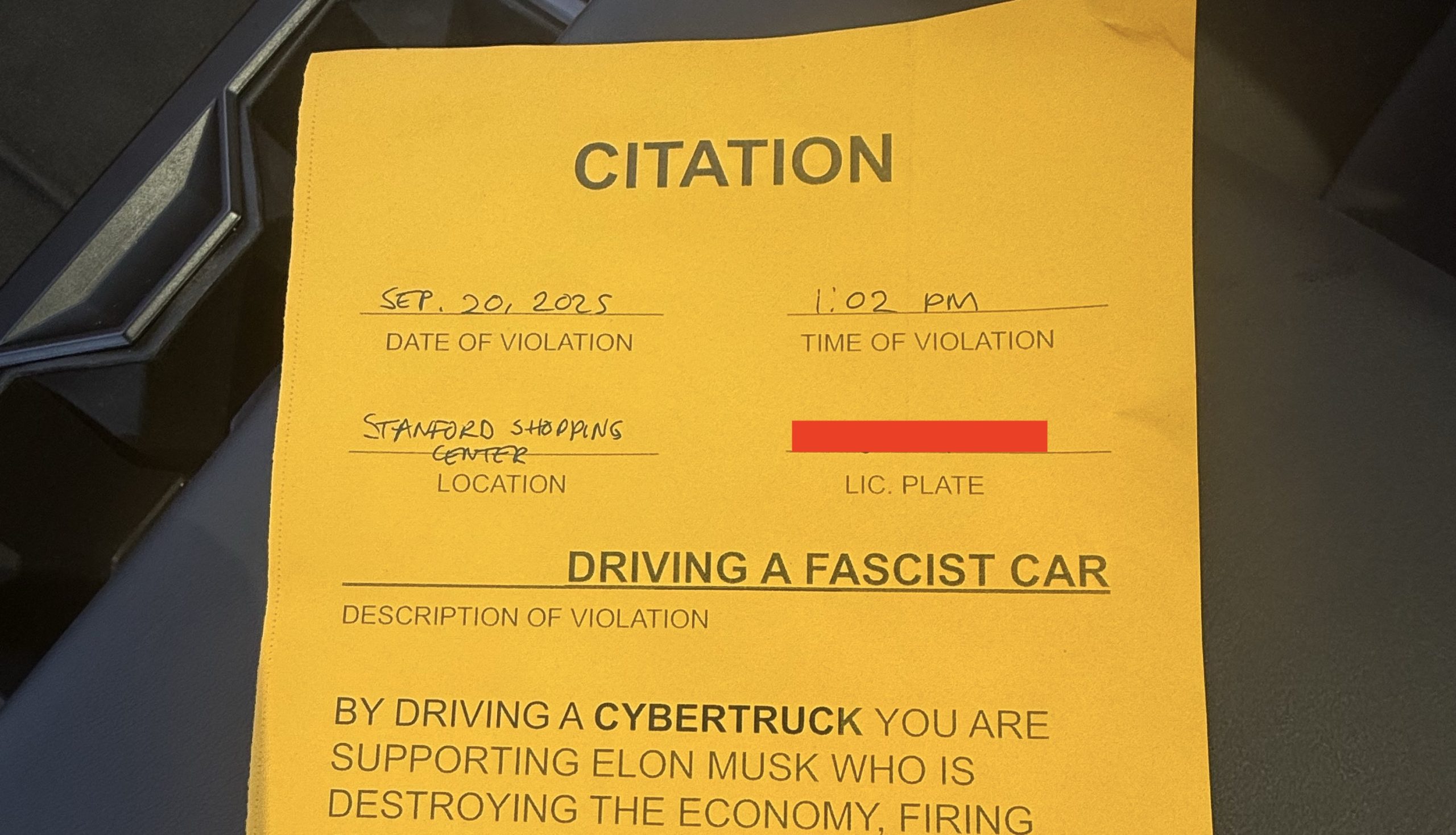
A Cybertruck parked at Stanford Shopping Center in California was recently hit with what might be the most try-hard piece of paper ever slipped under a wiper blade: a “fake citation” accusing the driver of supporting a “fascist car.”
The note, shared on X by Tesla staff program manager Ryan Torres, quickly made the rounds on X, where it quickly gained attention as an example of how not to protest.
The world’s least intimidating ticket
According to the citation, the supposed “violation” was “driving a fascist car.” The remedial action? Take the bus, call an Uber, or ride a bike. The note also dubbed Elon Musk a “chainsaw-wielding Nazi billionaire.” Now, protests against Tesla and Elon Musk have become commonplace this year, but one cannot help but cringe and feel second-hand embarrassment at the idea of a person just driving around with a stack of fake anti-Tesla/Musk citations.
Torres pointed out the irony himself in his post on X. Tesla currently employs over 140,000 Americans, and SpaceX has put the U.S. firmly back at the top of space technology. As Torres put it, maybe the person behind the world’s least intimidating ticket should “read a book on innovation before vandalizing” other people’s property.
Peak performative clownery
Not to mention that the fake ticket’s logic collapses under its own weight. EVs like the Cybertruck are literally designed to reduce emissions, not “destroy the economy.” If anything, Tesla has bolstered the United States’ economy by fueling jobs in engineering, manufacturing, and clean energy. It’s not the first time a Tesla has been the target of vandalism or politically charged notes, but this one stands out for sheer cringe value.
Torres summed it up neatly: “Peak clownery.” On that point, at least, the citation earns full marks. In a way, though, perhaps cringe fake tickets are not as bad as the literal firebombs that were being thrown at Tesla stores and cars earlier this year because some critics were gleefully misinformed about Elon Musk.








